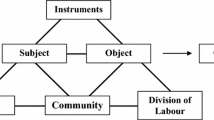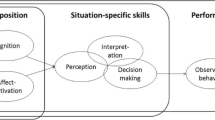Abstract
Argumentation has attracted attentions in science education for over two decades. In particular, argumentation has been recognized for its key role in linking theory and evidence. Meanwhile, tertiary chemistry students have widely acknowledged their challenges in coordinating theoretical knowledge presented in lectures and empirical data gathered through experimentation in laboratory contexts. Therefore, I proposed to explore argumentation, in a specific context, on a chemistry practical course in the university. Moreover, taken the complex learning environment into consideration, this study has employed activity theory as a theoretical framework to reveal the role of argumentation in the second year chemistry practical course in one university in the UK. The data were collected from different sources (including the students, the demonstrators, and the academic tutors) by various methods (such as individual interviews, observations, and the students’ experiment reports). Argumentation has been regarded as a necessary scientific skill to acquire instead of being a tool for learning. This has been advocated by the researchers and educators. Moreover, the different features of students’ oral arguments in the laboratory and written arguments in their experiment reports have been an implicit and explicit instructional context for these two tasks.
Access this chapter
Tax calculation will be finalised at checkout
Purchases are for personal use only
Similar content being viewed by others
Notes
- 1.
Retrieved from http://www.qaa.ac.uk/Publications/InformationAndGuidance/Documents/chemistryfinal.pdf on 11/12/2012.
References
Clark, D. B., Sampson, V., Weinberger, A., & Erkens, G. (2007). Analytic frameworks for assessing dialogic argumentation in online learning environments. Educational Psychology Review, 19(3), 343–374. doi:10.1007/s10648-007-9050-7.
Daniels, H. (2001). Current approaches to sociocultural and activity theory. In Vygotsky and pedagogy. London: Routledge/Farmer.
Driver, R., Newton, P., & Osborne, J. (2000). Establishing the norms of scientific argumentation in classrooms. Science Education, 84, 287–312.
Duschl, R., & Osborne, J. (2002). Supporting and promoting argumentation discourse. Studies in Science Education, 38, 39–72.
Erduran, S., Simon, S., & Osborne, J. (2004). TAPping into argumentation: Developments in the application of Toulmin’s Argument Pattern for studying science discourse. Science Education, 88(6), 915–933. doi:10.1002/sce.20012.
Evagorou, M., & Avraamidou, L. (2008). The role of technology in supporting the process of argument construction in science learning. Educational Media International, 45(1), 33–45.
Jiménez-Aleixandre, M. P. (2008). Designing argumentation learning environments. In Erduran & Jiménez-Aleixandre (Eds.), Argumentation in science education: Perspectives from classroom-based research. Dordrecht: Springer.
Jiménez-Aleixandre, M. P., Bugallo Rodríguez, A., & Duschl, R. A. (2000). “Doing the lesson” or “doing science”: Argument in high school genetics. Science Education, 84, 757–792.
Kuhn, D., & Udell, W. (2003). The development of argument skills. Child Development, 74(5), 1245–1260.
Langemeyer, I., & Nissen, M. (2005). Activity theory. In B. Somekh & C. Lewin (Eds.), Research methods in the social sciences. London: Sage.
Lawson, A. E. (2010). Basic inferences of scientific reasoning, argumentation, and discovery. Science Education, 94(2), 336–364.
Lee, M.-H., Wu, Y.-T., & Tsai, C.-C. (2009). Research trends in science education from 2003 to 2007: A content analysis of publications in selected journals. International Journal of Science Education, 31(15), 1999–2020.
Mason, J. (2002). Qualitative researching (2nd ed.). London: Sage.
Nardi, B. A. (1996). Studying context: A comparison of activity theory, situated action models and distributed cognition. In B. Nardi (Ed.), Context and consciousness: Activity theory and human-computer interaction. Cambridge, MA: MIT Press.
Osborne, J., Erduran, S., & Simon, S. (2004). Enhancing the quality of argumentation in school science. Journal of Research in Science Teaching, 41(10), 994–1020.
Roth, W.-M., & Lee, Y.-J. (2007). Vygotsky’s neglected legacy: Cultural-historical activity theory. Review of Educational Research, 77(2), 186–232.
Sadler, T. D., & Donnelly, L. A. (2006). Socioscientific argumentation: The effects of content knowledge and morality. International Journal of Science Education, 28(12), 1463–1488.
Sandoval, W. A., & Millwood, K. A. (2008). What can argumentation tell us about epistemology? In S. Erduran & M. P. Jimenez-Aleixandre (Eds.), Argumentation in science education (pp. 71–88). Dordrecht: Springer.
Simon, S., Erduran, S., & Osborne, J. (2006). Learning to teach argumentation: Research and development in the science classroom. International Journal of Science Education, 28(2–3), 235–260.
Spencer, L., Ritchie, J., & O’connor, W. (2003). Analysis: Practices, principles and processes. In J. Ritchie & J. Lewis (Eds.), Qualitative research practice: A guide for social science students and researchers. London: Sage.
Zohar, A., & Nemet, F. (2002). Fostering students’ knowledge and argumentation skills through dilemmas in human genetics. Journal of Research in Science Teaching, 39(1), 35–62.
Acknowledgement
Thanks to my supervisors’, Prof. Sibel Erduran and Dr. Federica Oliver, constructive suggestions and support all the way through.
Author information
Authors and Affiliations
Corresponding author
Editor information
Editors and Affiliations
Rights and permissions
Copyright information
© 2014 Springer-Verlag Berlin Heidelberg
About this chapter
Cite this chapter
Yan, X. (2014). Argumentation in University Chemistry Education: A Case Study of Practical Investigations from Activity Theory Perspective. In: Zhang, B., Fulmer, G., Liu, X., Hu, W., Peng, S., Wei, B. (eds) International Conference on Science Education 2012 Proceedings. Springer, Berlin, Heidelberg. https://doi.org/10.1007/978-3-642-54365-4_16
Download citation
DOI: https://doi.org/10.1007/978-3-642-54365-4_16
Published:
Publisher Name: Springer, Berlin, Heidelberg
Print ISBN: 978-3-642-54364-7
Online ISBN: 978-3-642-54365-4
eBook Packages: Humanities, Social Sciences and LawEducation (R0)




